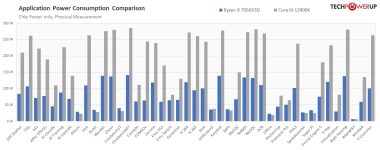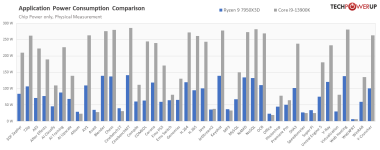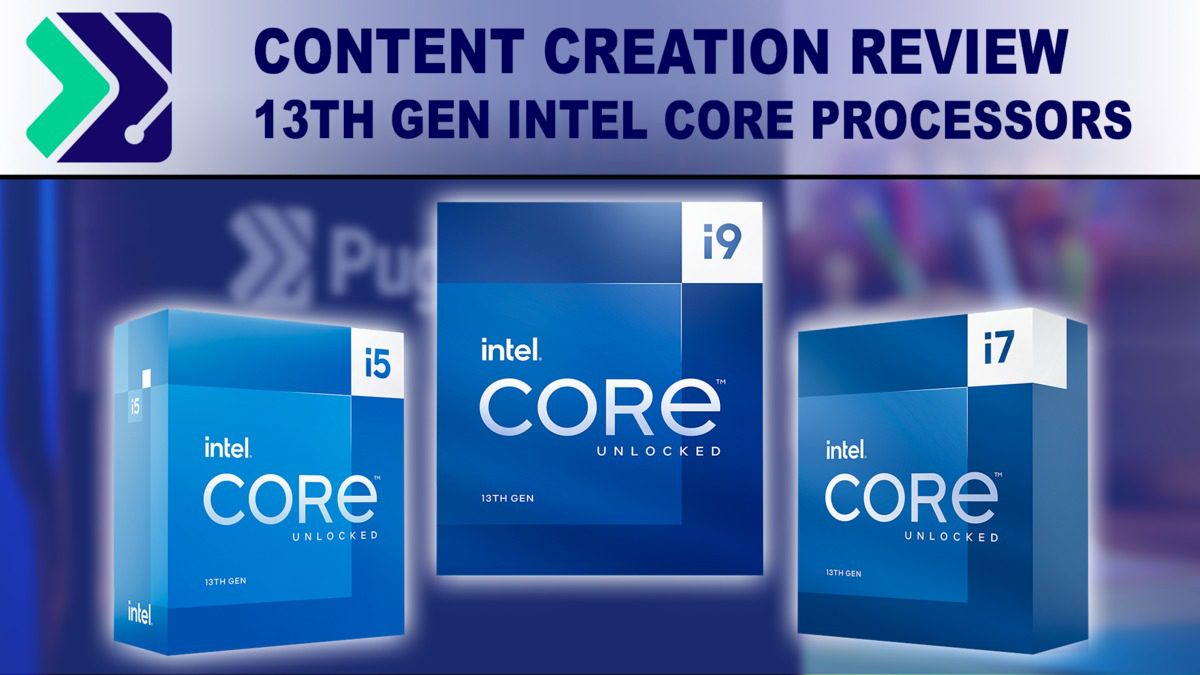You've changed man!
He’s on rotation!
Please remember that any mention of competitors, hinting at competitors or offering to provide details of competitors will result in an account suspension. The full rules can be found under the 'Terms and Rules' link in the bottom right corner of your screen. Just don't mention competitors in any way, shape or form and you'll be OK.
You've changed man!
In games, I agree, the 13900K is a pig. In productivity, no, it's perfectly fine, great I'd even say. Nobody, and I mean nobody, and I mean ABSOLUTELY nobody will be running a 13900k power unlimited at hour long multithreaded workloads. That would be just stupid. When power limited to sane levels it's competing with the 7950x. It loses mostly, in heavy mt workloads, but not by a lot, and it wins mostly in lighter threaded workloads. So it's a wash. Now quoting reviews that run cbr23 or blender with unlimited power is just borderline trolling.When you consider the gaming power usage of the 13900k vs 7950X3D (and 7800X3D) it shows the urgency that Intel need 14th gen. We're talking 3 times the power draw in games, and even more in productivity.
With electricity prices being what they are, this is a HUGE issue which Intel are likely furious about.
In games, I agree, the 13900K is a pig. In productivity, no, it's perfectly fine, great I'd even say. Nobody, and I mean nobody, and I mean ABSOLUTELY nobody will be running a 13900k power unlimited at hour long multithreaded workloads. That would be just stupid. When power limited to sane levels it's competing with the 7950x. It loses mostly, in heavy mt workloads, but not by a lot, and it wins mostly in lighter threaded workloads. So it's a wash. Now quoting reviews that run cbr23 or blender with unlimited power is just borderline trolling.

And you just did exactly what I claimed you were going to. Posted mt workloads with unlimited power... What professional runs 10 hour renders at unlimited power dude? Nobody.For productivity, The 13900k has monstrous power consumption compared to Zen4 in general. Intel uses over double the power in most productivity applications. There are many reviews with proof of this, here's one from Techpowerup:

Intel's 14th generation really needs to achieve parity with Zen4/Zen5, as electricity prices mean this is a real factor in purchasing decisions for consumers and especially business going forward.
But the gap is already 10 to 15% lolAnd how exactly do you expect Intel to do that? For Intel to reduce the power consumption gap by 10-15% would be a monumental achievement.
I really think you are missing how many PCs are brought from IT companies with them just set out the box for super large companies. We have 70+ PCs that come out the box settings and that is how they are run in the local office. We aren't even allowed to touch them or anything and require an external IT company to do anything with them. In the company that has 10k plus employees across the world they are also the same requirements with all systems run as they come stock. So as long as the chart above is at stock it is exactly as I would expect to see.And you just did exactly what I claimed you were going to. Posted mt workloads with unlimited power... What professional runs 10 hour renders at unlimited power dude? Nobody.
Anyways, this is a lost cause, people have abandoned reason for clickbaits, whateva.
I assume you are not running 24/7 renderings on those pcs. I'd be surprised if you did and your it company didn't set them up properly.I really think you are missing how many PCs are brought from IT companies with them just set out the box for super large companies. We have 70+ PCs that come out the box settings and that is how they are run in the local office. We aren't even allowed to touch them or anything and require an external IT company to do anything with them. In the company that has 10k plus employees across the world they are also the same requirements with all systems run as they come stock. So as long as the chart above is at stock it is exactly as I would expect to see.
And talking to the dozen of other companies are all very similar with the fact their 12th & 13th series systems they do have are just out the box settings.
You need to realise you are actually the exception at some point and not the rule or standard.
All our systems are always the K model because they always have higher boost out the box than non-k and they are 100% stock out the box settings and yes we run them over night and then use them in day otherwise and yes still at stock settings from the box so whatever that mobo happens to setup is exactly as they are set. They do nothing in BIOS other than set XMP and boot.I assume you are not running 24/7 renderings on those pcs. I'd be surprised if you did and your it company didn't set them up properly.
If you are talking about prebuilts, those are also preset up from the company that sells them. Power limits are set accordingly based on the cooler the company decided to use. Most of them anyways do NOT use k cpus with unlocked limits but the non k or the t versions that power down to 65 or 35w,making them both more efficient than a 7950x.
I don't think there is a single company out there that uses, for heavy mt workloads, unlocked cpus with 500w power limits. Never heard of it, never seen it in practice. And even if it does exist, they bought the wrong computer, it has nothing to do with Intel or amd. The same applies to the 7950x which in stock draws way too much power and is even less efficient than its predecessor.
So those graphs are just absolutely meaningless, especially for home users, even if they heavily utilize their cpus. Yes amd is more efficient in heavy mt but not by a lot, it's like 10 to 15%,and then they lose in almost every other task - and sometimes by a lot. For my line of work a 13900k is way more efficient than a 7950x,even at stock unlimited.
The thing that the 3d shines on, and the 13900k doesn't, is gaming efficiency ( and that's why I downgraded back to my 12900k) That's it. Everything else is a toss.
Regardless of all of that, if we both agree that the issue is the stock power limit of the k cpus that makes them inefficient, there is nothing that Intel needs to fix, at least technologically speaking. You can just buy a non k or a t cpu. They are actually more efficient at everything compared to an out of the box 7950x.
Well then the IT bought the wrong cpus, regardless of brand. That shouldn't be an argument against Intel since intel does provide skus for those who want out of the box efficiency.All our systems are always the K model because they always have higher boost out the box than non-k and they are 100% stock out the box settings and yes we run them over night and then use them in day otherwise and yes still at stock settings from the box so whatever that mobo happens to setup is exactly as they are set. They do nothing in BIOS other than set XMP and boot.
I know because I have multiple arguments about them being inefficient and needing to be setup to get the best and they are like "no it's fine the IT company did it and they work, if they get slow we will buy newer systems" and that is about the level management still really cares.
We utilise After Effects, Photosop, Permiere Pro, Unreal Engine 5, Blender, Lumion Rendering with VR.
Pretending isn’t going to help Intel.But the gap is already 10 to 15% lol
Lying ain't going to help amd either but here you are.Pretending isn’t going to help Intel.
Lying ain't going to help amd either but here you are.
Man you are too far gone into fanboyism territory. This is nuts, ignoredSo knock it off then?
Man you are too far gone into fanboyism territory. This is nuts, ignored
Well then the IT bought the wrong cpus, regardless of brand. That shouldn't be an argument against Intel since intel does provide skus for those who want out of the box efficiency.
But with that said, most of the workloads you mentioned, even an unlocked 13900k is more efficient than a 7950x. Especially the Adobe suite, it's not even a contest. With the exception of blender, and maybe lumion (have no idea what that is) intel is more efficient
For my workloads, which is mainly multitasking but not multithreading, my 3700x consumes around 5 times as much power as my 12900k
Zen 4 might be more efficient than my 3700x but no way it closes that gap
Well if they didn't / don't care about efficiency then it doesn't matter. A company that does care about it won't run heavy MT workloads at 500w is my point.They are as specced and suggested to thousands of companies. Again in 11yrs since I was paying attantion and things like the 3770k being specc'd every single company I have worked at have always had K chips for their desktop processors. This isn't a small number of users that just spec it based on the out of box highest Ghz and not bothered about efficiency or haven't been so much in the past. That is starting to change in the last couple of years but moving away from Intel is the bigger issue.
No, they actually don't. The graph above compares it to the 7950x 3d which has way lower limits than the normal 7950x. There is a video from the technotice channel, he is specifically making videos for content creators using mainly the adobe suite and he shows that intel is way way way more efficient than amd in those. The results are very eye opening in fact, intel makes zen 4 look outdated by at least 2 gens in those workloads.You second point is completely wrong though, all those programs which I mention have been shown to be more efficient out the box for AMD, the slide above even shows as such. Lumion is a rendering software for Architects mostly though generally construction industry in general. Adobe Photoshop even as shown is almost 80% higher power draw, so it might be 8% faster than a stock 7950x but it certainly isn't great difference in performance, puget systems whom also by way recommends K series chips often for machines. And the 7950x and 12900KS is about the same speed in Photoshop so it isn't all that huge of a figure.

 www.pugetsystems.com
www.pugetsystems.com
I feel like you ignored all context. The point was the 7950x3D. We don't have all the data so used performance data for the 7950x vs 13900k. Which as pointed out in the stuff it was wining it was 7-8% performance. Since the 7950x3D is within reason similar peformance to the non x3D but at a significant lower power usage then it would be the ideal out the box user case.Well if they didn't / don't care about efficiency then it doesn't matter. A company that does care about it won't run heavy MT workloads at 500w is my point.
No, they actually don't. The graph above compares it to the 7950x 3d which has way lower limits than the normal 7950x. There is a video from the technotice channel, he is specifically making videos for content creators using mainly the adobe suite and he shows that intel is way way way more efficient than amd in those. The results are very eye opening in fact, intel makes zen 4 look outdated by at least 2 gens in those workloads.
But regardless of all that the point im making is that zen 4 doesn't have an inherit advantage in efficiency. The whole difference in heavy mt comes specifically from the power limits chosen at stock. That's it. Choose the same power limits, and voila, the difference is 10 to 15% depending on the wattage selected. Going by CBR23 specifically which is a heavy MT workload, the 12900k scores 24k @ 125w, the 13900k scores 32-33k @ 125w. Let's say the 7950x does 36k at those wattages. Big whoop, the difference is literally 9%. Cant call that a huge gap.
And since you mentioned Puget, in the review about creative applications they concluded that their testing was completely one sided with intel winning almost everything! The below are direct quotes from their review found here

13th Gen Intel Core Processors Content Creation Review
Following AMDs recent release of their Ryzen 7000 Series desktop processors, Intel is fighting back with their own launch of the Core 13th Gen processors (code named "Raptor Lake"). Unlike AMD's launch which moved to a new socket and added support for DDR5, the 13th Gen CPUs are a drop-in...www.pugetsystems.com
in terms of dollar-for-dollar, Intel 13th Gen scored on par or significantly higher in every single benchmark we ran.
It is extremely rare that our testing ends up being as one-sided as this. We are used to Intel and AMD leapfrogging each other with each hardware launch, but there are usually at least a few areas where we can say that the competition was able to hold a lead – even if only a slim one. But, with 13th Gen, Intel has taken a very firm stranglehold for content creation at this budget level. AMD still has a firm lead at the “Workstation CPU” level with Threadripper PRO, but as far as consumer CPUs go, Intel has hit it out of the park with their new 13th Gen Intel Core processors.
in terms of dollar-for-dollar, Intel 13th Gen scored on par or significantly higher in every single benchmark we ran.
It is extremely rare that our testing ends up being as one-sided as this. We are used to Intel and AMD leapfrogging each other with each hardware launch, but there are usually at least a few areas where we can say that the competition was able to hold a lead – even if only a slim one. But, with 13th Gen, Intel has taken a very firm stranglehold for content creation at this budget level. AMD still has a firm lead at the “Workstation CPU” level with Threadripper PRO, but as far as consumer CPUs go, Intel has hit it out of the park with their new 13th Gen Intel Core processors.
Intel better hope 14th gen is something special. I don't see how it can compete with Zen4X3D based on what we know so far.

